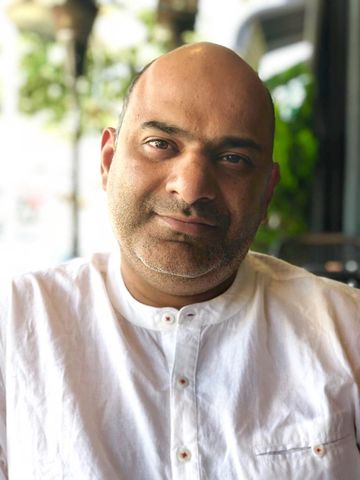Combating disinformation in the media of South Asia: Meet Indian journalist H R Venkatesh

H R Venkatesh is an Indian journalist who came to Stanford in 2018 through the John S. Knight Journalism Fellowship. As a JSK fellow, he is researching how news organizations can collaborate to fight disinformation, bias, and polarization in communities in South Asia. Below, he participated in an interview with the Center for South Asia as part of its annual newsletter.
Tell us about your background. Where did you grow up, and what inspired you to become a journalist?
I’m from Bangalore, India, a city which is sometimes called India’s Silicon Valley. But when I was growing up in the 1980s and 1990s, it was more known as “Garden City” or “Pensioners’ Paradise.”
I was influenced to be a journalist partly because of The Adventures of Tintin comics and all the adventures Tintin has around the world, and partly because my best friend had several issues of National Geographic magazine at his home. My mother offered encouragement, too, because she believed journalism is a noble profession and a service to society.
What motivated you to apply to Stanford’s John S. Knight Journalism Fellowship?
As a career journalist, I’d worked for a “byline” as an anchor, and also as an editor. I’d also been an entrepreneur and consultant. But increasingly, I no longer wanted to create journalistic content. I wanted to help journalists get better at their craft and media organizations get better at journalism. Now there are precious few opportunities to do that, and the JSK Fellowship was the place to apply to.
How did you become interested in researching disinformation and bias in the media, and can you describe some of your findings?
In early 2016, I launched my startup NetaData, with a focus on political accountability and combating polarization, which led me to research the landscape of “fake news” and polarization in India. This then led me to create a coalition of newsrooms to fact-check problematic content.
My biggest finding is that there are dozens and dozens of ways to combat disinformation, and at Stanford I got to speak to several people working on solutions from a technology perspective, journalism perspective, a media literacy perspective, and so on. I argued that, along with these bottom-up approaches, we needed a top-down approach too, such as a potential global information consensus.

Photo by Naveed Ahmed on Unsplash.
Tell us about the Ekta News Coalition that you founded and its efforts to address misinformation.
India is unique in that it has 22 official languages. So, in order to achieve any kind of scale nationally, you need to ensure you report in all languages. Now it’s pretty much impossible to reach that kind of scale on your own, or even if you’re part of a large corporate group. But if you stitch up a coalition of news organizations across the length and breadth of the country, you can do it.
That was always the thinking behind the Ekta News Coalition. Starting in May 2018, I held consultations with several media organizations and publishers, and also with people from technology companies and policy. These people and fact-checkers came together to form this coalition.
We put together a pilot project ahead of the state elections in Rajasthan in order to demonstrate that something like this would work. Our partners included the BBC, The Quint, and India Today. Over a period of two weeks, we put together 75 fact checks, and about a third of them were published. It was a success, and we demonstrated that such a coalition would work.

Photo by Amar De on Unsplash.
How have you collaborated with the Center for South Asia over the past year?
I’ve taken part in the center’s lectures and events, both as a participant and panelist. For example, I was part of a panel on India’s elections with the Indian ambassador to the U.S., Harsh Vardhan Shringla, and Stanford’s own Dinsha Mistree from the Law School.
What inspires or motivates you in your work?
I like the idea that journalism is my calling or vocation, and I’m obsessed with raising the bar in its processes. Increasingly, I feel that the best way to do this is to work with journalists rather than be a creator of journalistic content myself.
As the academic year comes to a close, what are your plans for the future?
Wherever I go, I’ll try to keep raising the bar on journalism and collaboration. I won’t run out of things to do in this space for a few decades more!
Stanford University students and scholars share their views on global events, research, and experiences abroad. Learn more at sgs.stanford.edu